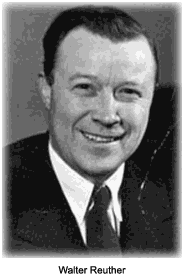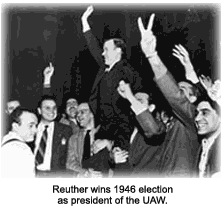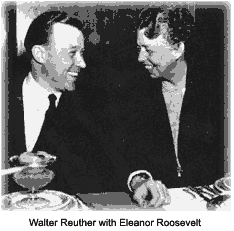Under the leadership of Walter Reuther, the United Automobile Workers (U.A.W.) union brought unprecedented prosperity to hourly employees of America`s auto manufacturers. As president of the Congress of Industrial Organizations (C.I.O.), he helped engineer its merger with the A.F. of L. in 1955 and became an influential leader of the AFL-CIO. Later, Reuther became dissatisfied with the organization and disaffiliated the U.A.W. from it in 1968. He was killed in a plane crash in 1970.
 Walter Reuther was born on September 1, 1907, in Wheeling, West Virginia. His father was a socialist brewery worker from Germany. Reuther, a high school student, received an early indoctrination into the Socialist Party when he visited party leader Eugene V. Debs, in prison for protesting World War I. Formal education did not hold Reuther`s interest, so he dropped out at age 16 to become an apprentice tool-and-die maker. Three years later, he moved to Detroit to find work in America`s most dynamic industry at the time, automobile manufacturing. He went to work for the Ford Motor Company in 1932. While in Detroit, Reuther completed his high school education at age 22 by attending Detroit City College (now Wayne State University).
The big auto companies at the time were strongly anti-union. In 1933, Reuther was inspired by the New Deal to work for the union cause at Ford. The company fired him for his efforts. Reuther then set out on a tour of Europe with his brother Victor, which took him through Nazi Germany — which appalled him — and the Soviet Union — which delighted him. In later years, Reuther lost his enthusiasm for the Soviets and became a staunch anti-communist.
Walter Reuther was born on September 1, 1907, in Wheeling, West Virginia. His father was a socialist brewery worker from Germany. Reuther, a high school student, received an early indoctrination into the Socialist Party when he visited party leader Eugene V. Debs, in prison for protesting World War I. Formal education did not hold Reuther`s interest, so he dropped out at age 16 to become an apprentice tool-and-die maker. Three years later, he moved to Detroit to find work in America`s most dynamic industry at the time, automobile manufacturing. He went to work for the Ford Motor Company in 1932. While in Detroit, Reuther completed his high school education at age 22 by attending Detroit City College (now Wayne State University).
The big auto companies at the time were strongly anti-union. In 1933, Reuther was inspired by the New Deal to work for the union cause at Ford. The company fired him for his efforts. Reuther then set out on a tour of Europe with his brother Victor, which took him through Nazi Germany — which appalled him — and the Soviet Union — which delighted him. In later years, Reuther lost his enthusiasm for the Soviets and became a staunch anti-communist.
 Upon his return, Reuther took a job with General Motors and began to organize the workers. In 1935, he brought together several small union locals and formed Local 174 of the U.A.W., with himself as president. The following year, he was elected to the U.A.W. Executive Committee.
Becoming a full-time union organizer, Reuther helped to organize many strikes for union recognition. While organizing Ford, he and other union organizers were severely beaten by Ford "service" men during the famous "Battle of the Overpass." Later, he was also beaten in his own home.
For the following 10 years, the U.A.W. enjoyed great success, even while it was driven by controversy. An active communist section of the union remained active until 1947, when it was finally driven from the union. Reuther was part of the socialist wing and had campaigned for Norman Thomas`s Socialist Party in 1932.
During World War II, Reuther strove to keep production running smoothly, painting a sharp contrast between himself and John L. Lewis of the United Mine Workers. While other labor unions were operating under a general no-strike policy in support of the war effort, on the eve of America`s entrance into World War II and in 1943, Lewis led more than half a million mine workers on strike, demanding wage increases. As a result, manpower shortages nearly crippled the war effort. In contrast, Reuther proposed joint planning of production between labor and management, a proposal that received a cool reception from management. Reuther became the U.A.W.`s first vice president in 1943. At the end of the war, his rise through union ranks culminated in his election as its president in 1946.
Reuther`s stance on wage increases stood in contrast to the more simplistic views of past union officials. He believed that stability in employment required profitability for the manufacturers, but that unions should share in the profitability and especially in the growth of productivity. He emphasized regular increases in real wages with every new contract.
Upon his return, Reuther took a job with General Motors and began to organize the workers. In 1935, he brought together several small union locals and formed Local 174 of the U.A.W., with himself as president. The following year, he was elected to the U.A.W. Executive Committee.
Becoming a full-time union organizer, Reuther helped to organize many strikes for union recognition. While organizing Ford, he and other union organizers were severely beaten by Ford "service" men during the famous "Battle of the Overpass." Later, he was also beaten in his own home.
For the following 10 years, the U.A.W. enjoyed great success, even while it was driven by controversy. An active communist section of the union remained active until 1947, when it was finally driven from the union. Reuther was part of the socialist wing and had campaigned for Norman Thomas`s Socialist Party in 1932.
During World War II, Reuther strove to keep production running smoothly, painting a sharp contrast between himself and John L. Lewis of the United Mine Workers. While other labor unions were operating under a general no-strike policy in support of the war effort, on the eve of America`s entrance into World War II and in 1943, Lewis led more than half a million mine workers on strike, demanding wage increases. As a result, manpower shortages nearly crippled the war effort. In contrast, Reuther proposed joint planning of production between labor and management, a proposal that received a cool reception from management. Reuther became the U.A.W.`s first vice president in 1943. At the end of the war, his rise through union ranks culminated in his election as its president in 1946.
Reuther`s stance on wage increases stood in contrast to the more simplistic views of past union officials. He believed that stability in employment required profitability for the manufacturers, but that unions should share in the profitability and especially in the growth of productivity. He emphasized regular increases in real wages with every new contract.
 Reuther also crusaded for other social benefits, from advocating universal health care by organizing the Committee of One Hundred, to promoting equal opportunities for blacks through his organization of the Citizens Committee for Equal Opportunity. He assisted in the establishment of the Health Alliance Plan in Detroit`s metropolitan area, which was one of the early HMOs. He also helped to acquire aid for housing and education in poor areas, worked closely with Martin Luther King Jr., and was one of the few non-blacks invited to speak at the March on Washington in 1963.
In 1952, Reuther became president of the C.I.O. He and George Meany, president of the A.F. of L., negotiated a historic merger between the two organizations in 1955 to form the AFL-CIO. Reuther became head of its Industrial Union Department. Frustrated with the AFL-CIO`s conservative views on a variety of issues, Reuther made the U.A.W. an independent union in 1968. The U.A.W. returned to the AFL-CIO in 1981.
On May 9, 1970, Walter Reuther perished in the crash of a leased jet while on union business. His wife May and three other people also were killed. His fighting spirit was sorely missed when waves of corporate downsizing laid cities to waste and created problems for American labor that continue to exist today.
Reuther also crusaded for other social benefits, from advocating universal health care by organizing the Committee of One Hundred, to promoting equal opportunities for blacks through his organization of the Citizens Committee for Equal Opportunity. He assisted in the establishment of the Health Alliance Plan in Detroit`s metropolitan area, which was one of the early HMOs. He also helped to acquire aid for housing and education in poor areas, worked closely with Martin Luther King Jr., and was one of the few non-blacks invited to speak at the March on Washington in 1963.
In 1952, Reuther became president of the C.I.O. He and George Meany, president of the A.F. of L., negotiated a historic merger between the two organizations in 1955 to form the AFL-CIO. Reuther became head of its Industrial Union Department. Frustrated with the AFL-CIO`s conservative views on a variety of issues, Reuther made the U.A.W. an independent union in 1968. The U.A.W. returned to the AFL-CIO in 1981.
On May 9, 1970, Walter Reuther perished in the crash of a leased jet while on union business. His wife May and three other people also were killed. His fighting spirit was sorely missed when waves of corporate downsizing laid cities to waste and created problems for American labor that continue to exist today.